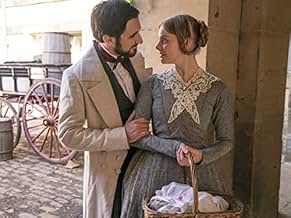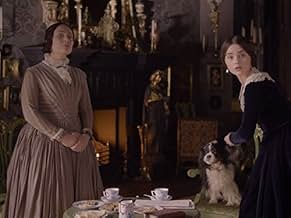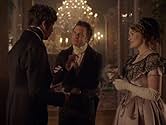La jeunesse de la reine Victoria, depuis son ascension au trône à l'âge de 18 ans jusqu'à sa cour et son mariage avec le prince Albert.La jeunesse de la reine Victoria, depuis son ascension au trône à l'âge de 18 ans jusqu'à sa cour et son mariage avec le prince Albert.La jeunesse de la reine Victoria, depuis son ascension au trône à l'âge de 18 ans jusqu'à sa cour et son mariage avec le prince Albert.
- Nommé pour 2 Primetime Emmys
- 11 victoires et 19 nominations au total
Parcourir les épisodes
Avis à la une
On the basis of seeing the first episodes of this Masterpiece drama, broadcast in the UK by ITV, I can freely say that I am hooked on to it. Daisy Goodwin's script is both taut and cleverly written, while the performances of the main protagonists are uniformly convincing. I particularly like Jenna Coleman's characterization of the young Queen - so apparently vulnerable yet possessed with an inner strength of will that enables her to resist the repeated blandishments of her self-interest mother the Duchess of Kent (Catherine H. Flemming), who so dearly desires to assume the title of Regent, aided and abetted by her unscrupulous ally Sir John Conroy (Paul Rhys).
This eight-part drama wears its moral scheme on its sleeve by contrasting the hissable villain the Duke of Cumberland (Peter Firth), with the pragmatic yet goodhearted Lord Melbourne (Rufus Sewell), who admires the Queen yet remains convinced that she has to transform herself from an immature girl into suitably monarchical material, and will try his utmost to achieve that transformation. Sometimes he has to be cruel to be kind, but all in a good cause. In between these two extremes stands the Duke of Wellington (Peter Bowles), and Sir Robert Peel (Nigel Lindsay), both members of the Tory Party (and hence implacably opposed to Melbourne's politics), but interested in maintaining the business of government.
As with most television costume dramas, the sets and decor are both opulent and historically accurate, supplemented by useful CGI shots where necessary. I especially liked some of the cinematographic effects (by John Lee) - especially the use of aerial shots to suggest the insignificance of humanity when compared to the greater business of running the country.
And it is this sense of contemporaneity that lifts VICTORIA out of the run-of-the-mill and transforms it into living, breathing drama. We hear a lot about the importance of "duty" - from the Queen as well as her friends and enemies - and we are led to speculate on what that term really signifies. Is it just a catch-all description masking self-interest, or do people really believe in it? In light of recent political upheavals in the United Kingdom, with one Prime Minister resigning (ostensibly out of "duty"), and the opposition party tearing itself asunder with different conceptions of the same term, we wonder just how much VICTORIA is commenting on the present as well as the past, especially in its concern with politics and its relationship to the country's future.
I am definitely hooked, and await the remaining episodes with eager anticipation.
This eight-part drama wears its moral scheme on its sleeve by contrasting the hissable villain the Duke of Cumberland (Peter Firth), with the pragmatic yet goodhearted Lord Melbourne (Rufus Sewell), who admires the Queen yet remains convinced that she has to transform herself from an immature girl into suitably monarchical material, and will try his utmost to achieve that transformation. Sometimes he has to be cruel to be kind, but all in a good cause. In between these two extremes stands the Duke of Wellington (Peter Bowles), and Sir Robert Peel (Nigel Lindsay), both members of the Tory Party (and hence implacably opposed to Melbourne's politics), but interested in maintaining the business of government.
As with most television costume dramas, the sets and decor are both opulent and historically accurate, supplemented by useful CGI shots where necessary. I especially liked some of the cinematographic effects (by John Lee) - especially the use of aerial shots to suggest the insignificance of humanity when compared to the greater business of running the country.
And it is this sense of contemporaneity that lifts VICTORIA out of the run-of-the-mill and transforms it into living, breathing drama. We hear a lot about the importance of "duty" - from the Queen as well as her friends and enemies - and we are led to speculate on what that term really signifies. Is it just a catch-all description masking self-interest, or do people really believe in it? In light of recent political upheavals in the United Kingdom, with one Prime Minister resigning (ostensibly out of "duty"), and the opposition party tearing itself asunder with different conceptions of the same term, we wonder just how much VICTORIA is commenting on the present as well as the past, especially in its concern with politics and its relationship to the country's future.
I am definitely hooked, and await the remaining episodes with eager anticipation.
I usually don't mind when movies or shows are not historically accurate. Typically changed for dramatic effect and better pacing. However, they made Queen Victoria seem more caring about the ignored classes. She did not intervene on behalf of the Newport Chartists. She did not show compassion for the Irish during the Great Hunger and was known as the Famine Queen. Changing history to make people feel better about history is dangerous. It reduces the struggle and discrimination of people considered as other. Outside of the misrepresentation of Queen Victoria, the acting, set, costumes, screenwriting, and cinematography are commendable.
I can not believe the production company nor the various directors could/would want to end the series where they did, in the middle of an emotional crisis. There are another 40 plus years of history, let alone many wars, adventures, and the entire Industrial Revolution. Is it that actors were tired of the fabulous custumes or were they tired of riding in unglamorous coaches? I think most of the watching audience had emotional attachments to many of the characters and or actors, including good, bad, love and disgust, all good character development!!! It will never be too late to revive the series, albeit the actors have aged, but so have the characters!
Jenna Coleman's acting is worth an award. Camera work by John Lee is extraordinary (the right eye for detail), music is extremely well suited, the costumes are exquisite. It's a feast for the eye and while looking at it you just tend to forget the quibbles about it's historical mistakes.
I do hope someone else picks it up if the studio decided to cancel, tho it seems unlikely. :(
Love this show. I started watching few weeks ago and now when I finished season 3 I find out the story was not completed and that there is no season 4.
Sad.
Love this show. I started watching few weeks ago and now when I finished season 3 I find out the story was not completed and that there is no season 4.
Sad.
Le saviez-vous
- AnecdotesJenna Coleman was allowed to read Queen Victoria's diaries as research. Parts of the diaries were removed upon the Queen's instruction shortly after her death.
- GaffesThroughout the series, Victoria's dresses have zippers, some of which are even used on screen. Zippers were invented in 1851, and weren't introduced to the public until the Chicago World Fair in 1893, where they were met with little commercial success. The first use of a zipper in clothing occurred in 1925, 24 years after Queen Victoria died.
- Versions alternativesSeries 1: PBS Masterpiece broadcasts add on average 5 minutes of additional footage per episode not shown in the ITV broadcasts. The exception to this are the first two episodes of Series 1 which for PBS airing were edited together to form a single feature-length episode for a two-hour timeslot; the edited version removes several minutes of footage from these episodes (including the original closing moments of episode 1). The North American DVD/Blu-ray release of Series 1 is the ITV version and thus does not include the extra footage seen on PBS. Also, the ITV broadcasts/DVD release indicate episode numbers in the opening credits alongside episode titles; this is not shown on PBS.
- ConnexionsFeatured in Too Much TV: Épisode #1.21 (2016)
Meilleurs choix
Connectez-vous pour évaluer et suivre la liste de favoris afin de recevoir des recommandations personnalisées
- How many seasons does Victoria have?Alimenté par Alexa
Détails
- Date de sortie
- Pays d’origine
- Sites officiels
- Langue
- Aussi connu sous le nom de
- Вікторія
- Lieux de tournage
- Sociétés de production
- Voir plus de crédits d'entreprise sur IMDbPro
Contribuer à cette page
Suggérer une modification ou ajouter du contenu manquant









































